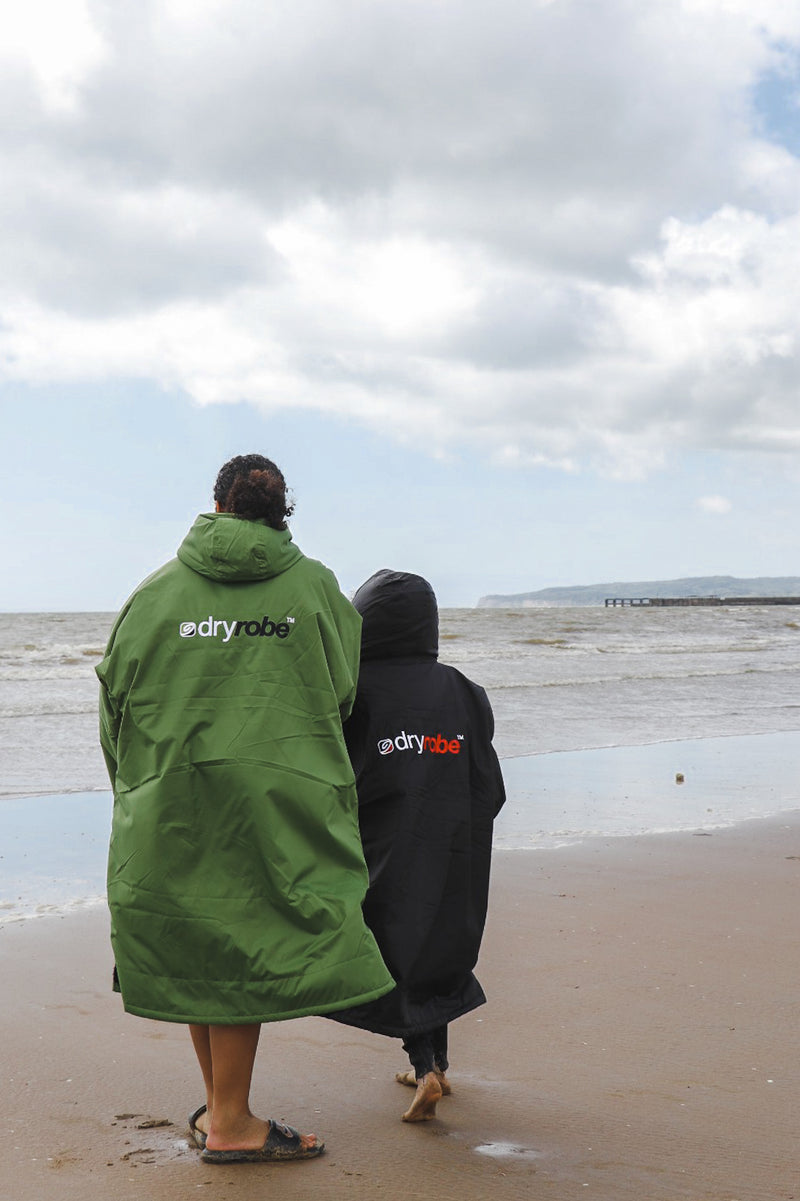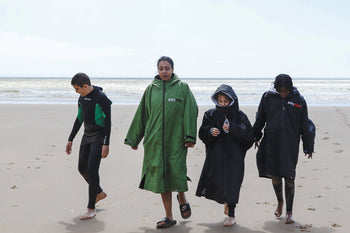10 minute read
Can you remember the first time you saw the sea and how it felt?
If you live by the coast, it is easy to take for granted the positive impact the sea can have on your overall wellbeing. It’s no wonder many of us can’t wait to escape and spend some time by the ocean as soon as there is the opportunity!
Wildlife Filmmaking MA student, Alice Geary wants to ensure that every child gets the opportunity to experience the joys the sea can bring. Her film, Finally I Sea, shares the impact that experiencing the sea, or even leaving inner-city London, for the first time has on 9 - 11 year old children.
Determined to bridge the gap between children and the sea in order to help preserve our oceans in the future, Alice’s mission has unveiled many other important issues that come with 20% of British children never seeing the sea as a result of socio-economic inequality.
As part of the dryrobe® Warmth Project, we were proud to provide dryrobe® Advance change robes for the children involved in the documentary to keep them warm during their first visit to the beach.
We were excited to catch up with Alice to find out what it was like to witness the children seeing the sea for the first time, why 20% of British children haven't experienced the coast and what the film hopes to achieve for both children and the future of our coasts.

Tell us a bit about your upcoming film, Finally I Sea?
Finally I Sea is a short film which focusses on a 9-year-old girl who has never been given the opportunity to see the sea before due to barriers out of her control.
The story follows Omie Dale, an environmental activist and swimming instructor, taking her and some friends to see the ocean for the very first time.
It is a simple, feel-good film focussing on the joy that a day by the ocean can create.
However, it has a deeper, underlying message that children in the world today are the most important generation in the fight to protect our planet, yet due to increased living prices, it is becoming harder and harder for children to access nature.
Finally I Sea is an intimate, human-led story which will use interviews, raw conversations with children and beautiful shots of the British coast to paint a picture of how important it is for children to have the opportunity to experience the natural world.
When did you realise that introducing children to the transformative power of the coast was important to you and why?
As a child, I was incredibly fortunate to be able to visit Cornwall most summers. I’m from a village in Leicestershire, which is the furthest point from the sea in the UK, and so visiting the coast was always exciting to me.
The seaside felt like a playground. It was a place where I could be curious and adventurous but as I have grown up, it has also become a place of calm. Because of this, I believe the coast played a big part in my development and made me fall in love with the natural world.
Hearing that so many children have never seen the sea made me think about my own seaside experiences and how unfair it is that so many children can’t access the ocean. I want every child to be able to experience a care-free fun day at the beach for their own mental wellbeing. But I also think that it is incredibly important for children to experience and fall in love with the natural world as they are the generation that we are relying on to save our planet. They need to be given the chance to fall in love with the world, in order to want to save it.
Where have you been filming in the UK and why did you choose those locations?
The children that I took to the seaside live in London. I chose to base Finally I Sea in London as the city landscape differs hugely from the coast. This was important as most of the children in the film had never left London before and so I was excited to get them out of the hustle and bustle of the city, into the calm and serene countryside for the very first time.
I felt incredibly lucky that I was able to give them this opportunity. This hit home for me as the children became very excited as we drove past a cow!
For the beach location, we went to Camber Sands in East Sussex. As it was their first coastal experience, I wanted to find somewhere that was picturesque, clean and not too far away from London and Camber Sands ticked all of those boxes.
It was a beautiful day when we arrived and was very quiet – so much so that it almost felt like we had the beach to ourselves!
Why do you think that 20% of British children have never laid eyes on the sea?
There are many reasons for this but there are some that outweigh the others and sadly, they are often completely out of the child’s control.
The biggest factor, and the one that I focus on in Finally I Sea, is poverty. Many families are unable to afford everyday essentials such as clothing and food, and so they have to miss out on things that most of us take for granted, like a day at the seaside.
Often families from inner cities do not own a car and so must rely on public transport which can be hugely expensive, and then the extra cost of swimwear, ice creams, bucket & spades etc. on top of that makes it very difficult for people with no disposable income to prioritise these trips; a problem that is constantly being exacerbated by the increasing cost of living.
Another shocking reason is race - something that the amazing Omie Dale speaks about in Finally I Sea. Systemic racism has left many people of colour living in areas without access to nature, in fact around 40% of people from BAME backgrounds live in the most green-deprived areas, compared to just 14% of white people.
Studies are increasingly suggesting that time spent outdoors, in green or blue spaces, improves people's physical and mental health and so it is a huge injustice that so much of the British population are unable to access them. 
How do you think we can educate on the importance of children experiencing the sea and encourage more trips to the coast for those who live inland?
I’m glad to hear that more and more schools are now teaching children about the importance of our oceans and mental wellbeing, but families that live in poverty also tend to go to schools which have very little funding. This means that trips to the coast are very difficult to arrange without external help.
I hope that films like mine will educate people on the barriers that many of our population are facing and that this will help groups, like schools, to get more funding to go towards fun trips in nature.

Are there any impactful moments from filming that you weren’t expecting when you first started this project?
When I started this project, I wasn’t aware that most of the children had never left London.
My aim was for them to experience a fun day at the seaside for the first time but hearing that they had never left the city made the whole experience even more impactful.
It meant that this trip would be their first time seeing many things, not just the sea. Before setting off on our journey many of the children said that they imagined everywhere out of London being just as busy and crowded and so watching their faces as we drove through a tiny, quiet village full of cows and fields was quite the experience.

What was it like to witness the children's reactions when first they first saw the sea?
It was incredible. I felt very lucky to be able to witness such a raw moment.
From the car park at Camber Sands, you walk up a steep sand dune, and it isn’t until you reach the very top that you can see the sea for the first time. When the children reached this spot, they all stopped and stared with a little smile on their face, taking it all in.
This moment seemed to last a lifetime and was very emotional. But before I knew it all of the children were sprinting towards the sea, squealing in excitement for their first swim in the ocean. It is a moment that I will never forget.
What positives are you hoping will come with the release of the film in September?
I am hoping that Finally I Sea will make people more aware of the barriers that are stopping a lot of our population from being able to access nature.
I have witnessed many shocked faces when I explain to people how many children have never seen the sea and so I would love for this to become common knowledge. From there, action needs to be taken.
I would love to rally together to get train companies in the UK to give out a set amount of free train tickets to the seaside each year to families living in poverty.
There are also a number of amazing charities that are working hard to combat these issues such as Keep Britain Tidy, Seaful, The Wave Project and of course the dryrobe® Warmth Project. I would love to use Finally I Sea to fundraise for these charities and put that money into taking more and more children on their first trips to the seaside.

The film is to be released in October 2022, and will be available to watch for free online.
To help contribute to its production and promotion, you can donate at www.gofundme.com/f/finally-i-sea.
Published on July 21, 2022
